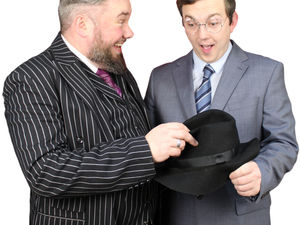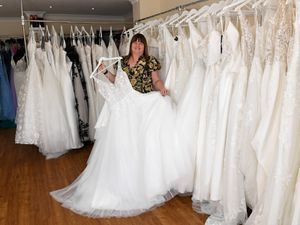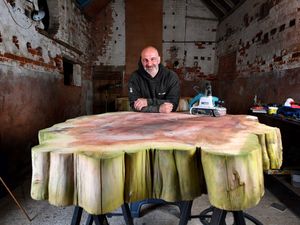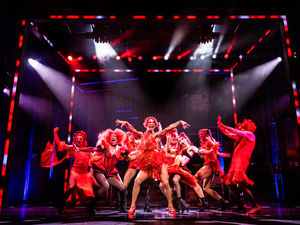What's life really like as a funeral director?
They say that nothing is certain but death and taxes.
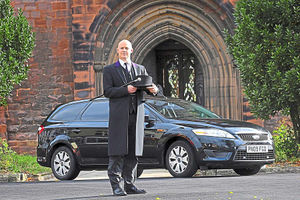
If you come face to face with the tax man, you're unlucky. If you come face to face with a funeral director, you're the most unlucky of all.
We presumed that working in a funeral home must be a gruelling and unhappy job. Dealing with the dead, the dying and the grieving every day must be a role reserved for only the most resilient, stony-faced people in society.
When we tentatively arrived at the Co-operative Funeralcare in Monkmoor, Shrewsbury, to find out what life as a funeral director was like, we were instantly proved wrong.
Greeted at the door by the friendly face and warm handshake of principal funeral director Richard Owen had us immediately at ease. The funeral home itself was a comfortable and peaceful place, freshly decorated in muted shades of purple.
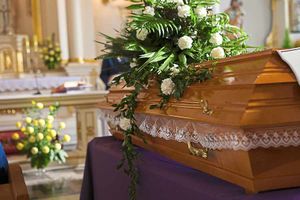
Richard, aged 30, has been working in the funeral industry for seven years. A principal funeral director in a small town, he's as hands on in his role as it gets. From collecting bodies from the place of death right through to embalming them, Richard has trained on the job to help give people their final send-off.
"I previously worked for the housing department of the council and wasn't a fan of all the politics of working in an office, or being stuck at the same desk day in and day out."
Richard, who studied politics and law in Newcastle upon Tyne, decided to change career and began working as a trainee at the Co-op.
"There's more to my job than people think. After seven years, I'm quite good at doing people's make-up.
"We wash everyone's hair, so I ask people to bring in a photo of their loved one, so I can curl or straighten or otherwise style their hair as they'd want it.
"There are a lot of legalities to deal with and paperwork to manage. You have to juggle the schedules of ministers and doctors and arrange flowers and notices in the paper. More importantly than any of this, the family always comes first."

A family man himself, Richard has a wife and two children under the age of five at home. Life as a funeral director can mean you're busy on weekends and public holidays, so having an understanding family is a must, particularly when dealing with challenging and upsetting situations at work.
"My wife is a science teacher at a school and doesn't really want to talk about the specifics of my job too much. If there's something I want to talk about I do, and she listens. I go down to the golf range and hit some golf balls to get out any frustrations and I lark around with the kids too.
"I always make sure that I have something to look forward to. Not necessarily parties every night, just something simple. That might be playing with the kids, going for a pint or for a walk.
"It's hard if I get called away on Christmas Day or on weekends when we have plans with the kids. My wife might say 'you're always getting called out!' but I just have to remember what I'm doing it for."
It's that level of consideration for the needs of others in a situation less fortunate than him that clearly makes Richard so good at his job.
"I won't listen to music or anything when caring for and preparing someone's loved one, so I often talk to them whilst I'm working. I'll tell them that I met their family and how nice they were, or talk about their funeral.
"If you're dealing with the death of a child or there are particularly tragic circumstances, arranging a funeral with the family can be challenging. Even when I'm on the verge of tears, I have to remind myself that my day is not as bad as this person's day.
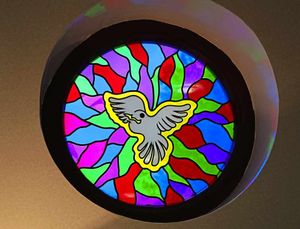
"It doesn't get any easier and there are a couple of times a year where no matter how much you do to ensure the funeral goes ahead as smoothly and as well as possible, you feel helpless once you're done.
"Families rely on you to be professional and you have the satisfaction of knowing you've given their loved ones the best possible send off." For Richard, the worst part of the job doesn't come from any sights or smells that he may encounter in his role, but rather from the disappointment of everything not going right on the day.
"We try to ensure that everyone has the send off that they'd want. Ninety per cent of people want a traditional funeral but we've had special requests in the past too. We try and get around everything; if it's legal and cleared with the people that if affects, we'll make sure it happens.
"The worst part of the job is when you feel you've done all you can and the funeral doesn't go as well as it could. For example, if a minister gets a name wrong or some masonry comes loose, that's out of my control but it's so disappointing."
Before we left, we had one last burning question. In an industry filled with tears and sadness, can a funeral ever be fun?
"There's no such thing as a standard funeral, and funerals can be fun, as long as we don't overstep any boundaries, of course. Some people may have Bring Me Sunshine by Morecambe & Wise or Always Look on the Bright Side of Life from Monty Python playing at their funeral!
"It can be enjoyable, even. We've seen people come to the chapel in Hawaiian shirts and even had 20 cyclists following the hearse to the chapel."
On leaving the funeral home, we turned to say 'see you later' before the phrase caught on our lips. As lovely as Richard was, a passionate family man and compassionate professional, he's the only person we've ever interviewed who we hoped we wouldn't have to see again any time soon.

